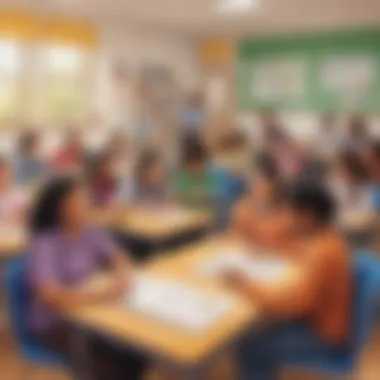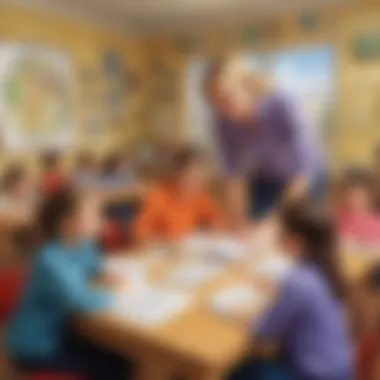Enhancing Children's Learning: Diverse Objectives for Lesson Plans


Interactive Learning Games
In today's digital age, interactive learning games have become a popular tool to engage and educate children. By incorporating elements of play and problem-solving, these games not only entertain but also stimulate young minds in a fun and educational way. Some of the top educational games include math puzzles, language matching games, and science simulations. These games are designed to challenge children's cognitive abilities and promote critical thinking skills. Moreover, playing educational games has been shown to enhance children's cognitive development by improving their memory, attention span, and problem-solving skills. Through in-depth reviews, educators and parents can gain insights into the gameplay mechanics and learning outcomes of each game, enabling them to make informed decisions on which games best suit their educational objectives.
Educational Topics
Exploring educational topics in diverse subjects like math, science, languages, and more is essential for fostering a well-rounded education. Incorporating interdisciplinary learning approaches can provide a holistic development experience for children. By compiling articles that cover various subjects, educators and parents can nurture children's curiosity and appreciation for different fields of knowledge. Understanding the importance of interdisciplinary learning can help in creating lesson plans that are both engaging and enlightening, paving the way for a comprehensive educational journey.
Tips and Tricks


Unlocking the secrets to enhancing children's learning journey involves practical tips and strategies for parents and educators. By infusing creativity and innovation into teaching methods, the learning process can be transformed into a dynamic and exciting adventure for children. Practical tips such as incorporating hands-on activities, interactive discussions, and personalized learning approaches can significantly enrich children's educational experiences. Implementing strategies that make learning fun and engaging not only captivates children's interest but also fosters a deep appreciation for learning in general.
Creative DIY Projects
Engaging children in creative do-it-yourself (DIY) projects is a fantastic way to promote creativity and skills development. Offering step-by-step guides for various DIY projects can encourage children to explore their artistic talents and hone their problem-solving abilities. By using simple household items creatively, children can unleash their imagination and express themselves artistically. Furthermore, engaging in hands-on activities through DIY projects enhances cognitive and motor skills, fueling children's creativity and confidence in their abilities. The importance of artistic expression in children's development cannot be understated, as it nurtures their individuality and enriches their overall learning experience.
Introduction
In this article, we delve into the crucial aspect of forming objectives for lesson plans, a fundamental pillar in enhancing children's learning journey. Objectives act as the guiding stars that illuminate the path for educators and parents, directing them towards creating educational experiences that are not only engaging but also highly effective. By setting clear objectives, teachers can focus their instructional efforts, ensuring that every step taken in the learning process is purposeful and geared towards specific outcomes.
When constructing lesson plans, the inclusion of well-defined objectives is paramount. These objectives serve as the backbone of the entire teaching structure, informing educators of the knowledge and skills they aim to impart to young minds. Through meticulously detailing the desired outcomes, teachers can align their teaching strategies with the ultimate goal of promoting holistic development in children. Successful lesson plans are built on a foundation of clear and measurable objectives, paving the way for organized and impactful learning experiences.


This article shines a light on the significance of setting objectives in lesson planning, underscoring their role in shaping the educational landscape for students. By outlining various objectives across different domains, ranging from cognitive development to life skills enhancement, we aim to provide a comprehensive roadmap for educators and parents alike. Through thoughtful consideration and strategic planning, we empower teaching professionals to tailor their lessons to meet the diverse needs and interests of their students, fostering a rich environment for learning and growth.
Building Self-Confidence
Building self-confidence plays a vital role in shaping children's self-perception and resilience. By fostering self-confidence, educators empower students to express themselves, take on challenges, and believe in their capabilities. This aspect of social-emotional growth builds a strong foundation for children to navigate obstacles with confidence and positively assert themselves in various contexts.
Language and Literacy
Expanding Vocabulary
Expanding vocabulary enriches children's language skills and empowers them to communicate effectively. By introducing new words and enhancing vocabulary, educators broaden students' capacity to express themselves clearly and articulately. This linguistic development paves the way for improved reading comprehension, writing proficiency, and overall communication skills.


Developing Reading Comprehension
Developing reading comprehension is vital in helping children extract meaning from written texts and engage critically with literature. By enhancing reading comprehension, educators equip students with the skills to interpret, analyze, and evaluate various forms of written material. This aspect of language and literacy development fosters a deeper appreciation for reading and cultivates strong analytical abilities.
Enhancing Communication Skills
Enhancing communication skills is essential for children to convey their thoughts, feelings, and ideas effectively. By focusing on communication skills, students learn to articulate their opinions, listen actively, and engage in meaningful discourse. This skill set not only improves children's ability to express themselves clearly but also enhances their interpersonal relationships and conflict resolution capabilities.
Conclusion
In the realm of education, the conclusion is not just an endpoint but a crucial reflection point that encapsulates the significance of the entire journey delving into the complexities of objectives in lesson planning. In this article, the conclusion serves as a pivotal element that ties together the essence of setting objectives for educational endeavors. Understanding the importance of having solid conclusions in lesson plans is instrumental for educators and parents in shaping a well-rounded learning experience for children.
The conclusion section stands as a beacon of guidance, offering a roadmap for both educators and parents to assess the efficacy of the lesson plans. It acts as a mirror reflecting how successfully the objectives have been met, highlighting areas of improvement, and paving the way for future iterations in educational strategies. By recognizing the value of a well-crafted conclusion, stakeholders in the education domain can enhance the overall effectiveness and impact of teaching methodologies.
Furthermore, the conclusion not only serves as a wrap-up but a platform to celebrate achievements, evaluate learning outcomes, and recalibrate objectives for continuous improvement in pedagogical practices. It underscores the necessity of evaluating the set objectives against the actual outcomes, enabling a feedback loop that fosters agile and adaptive teaching approaches. Embracing the conclusion as a vital component in lesson planning is synonymous with embracing adaptability, growth, and continuous learning in the educational landscape.
In essence, the conclusion segment in lesson planning is not merely a summary; it is a reflection of dedication, commitment, and passion towards nurturing young minds. By emphasizing the importance of crafting insightful conclusions, educators and parents can instill a culture of reflection, refinement, and innovation in the learning journey of children. Thus, the conclusion serves as a cornerstone in the educational edifice, anchoring the objectives while propelling learning experiences to new heights.















